Photo

Now, in Bolivia, there is a Ministry of Decolonisation. They themselves don’t understand, much less do the people understand, what it really is to decolonise. To remove the ‘chip’ from memory, everything they brought – in this case, the Spanish or the Incas – to impose a single culture, a single thought; to ‘implant’ a culture, a way of thinking, a way of being. We are in a globalised world, [but] it is pluricultural in Bolivia. I believe in Palestine there are also different cultures, different customs. As I said at the beginning, didn’t I, heritage is always the identity of a country, of a people that it conserves.
The changes that time and technology bring cannot erase overnight what existed before. It is good to be structured, schematic, so that all authorities on duty are concerned to keep alive the identity, the culture, the heritage. [But] on the other hand, we cannot reject technology, the changes that happen in time. Technology brings good things. The world is instantly everywhere, an exchange of knowledge. It would also be good to use these means. We cannot be on the sidelines, at the margins of globalisation. Whether we want to or not, we have to be there. Thank you for allowing us to arrive ‘live and direct’ to Palestine, although not physically. – Padre Efrain
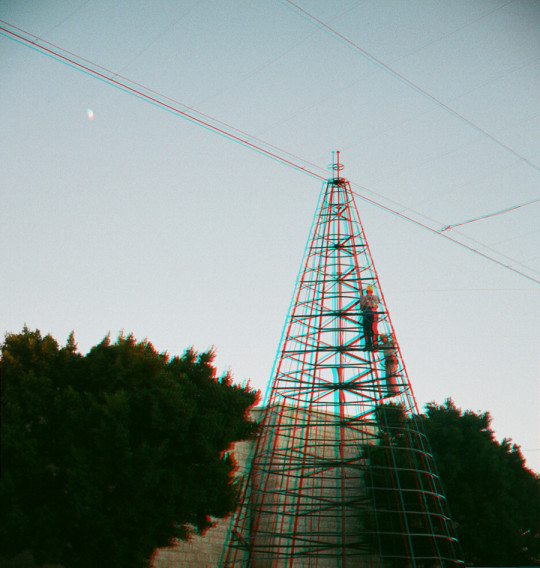

#bolivia#potosi#palestine#west bank#bethlehem#world heritage#unesco#free palestine#decolonise palestine#stereography#stereoview#3d photo#anaglyph#wigglegram#35mm#oral history
0 notes
Photo
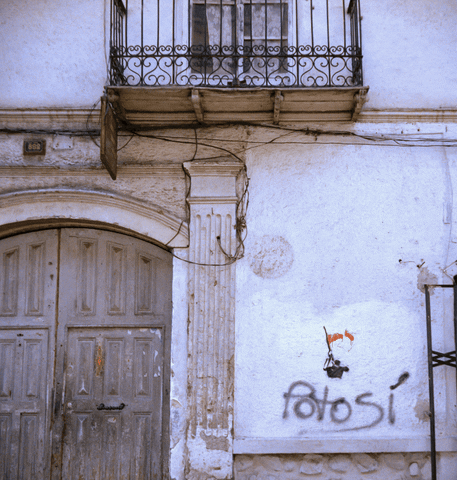
In the streets and squares, we bring suffering and hope
And here we remain, scattering the embers
Now I go and in my chest is a cry
All together comrades: “The miners will come back!”
In the streets, in the squares, they will find our chests
We have come from afar to demand our rights
In the hands and in the face, we bring suffering and hope
And here we remain, scattering the embers
Now I go and in my chest is a cry
All together comrades: “The miners will come back!”
Now it’s just a shout: “The miners will come back!”
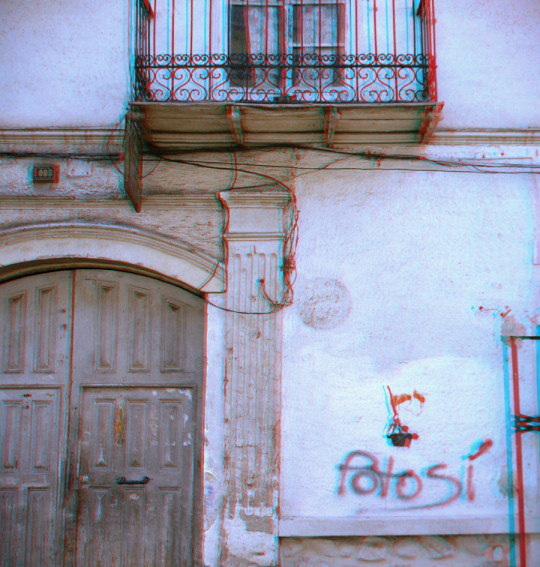

#bolivia#potosi#world heritage#unesco#stereography#stereoview#3d photo#anaglyph#wigglegram#35mm#oral history
0 notes
Photo

One of the representative elements of the [Mint] is perhaps this face that marks an identity of the house. That is the mask of the Mint, which of course has its own meaning. In [there], where the mask is, was the shield of Spain as the main symbol of the time. Later, this mask was placed, which is not colonial – it was, rather, during the time of the republic. According to tradition, it was placed on the shield of Spain in 1852 by a French sculptor as a mockery towards the Spanish period. The mask covers the shield, like saying ‘enough’ to the colonial period. That opened a free and republican era for the new state – it was a way to mark the end of an era and start a new one. So there are two feelings that are found and expressed in the face of the mask.
It is a mask that identifies a time in the past, but that reflects a present, [and] a future as well. I really do not know if the sculptor would have thought of it in those terms, but it is like a feeling instead, a symbolic element, which is like a mirror that at some point sees a past, expresses that past in this symbology, and shows in the present that the Potosínos – although we have a sorrow, a pain, a sadness, a burdened situation… To say that we have suffered. Someone has done that to us [and] it is a long list of things. And [that] we should not live like that. Living a future with the wealth that they have bequeathed us, we should be happy instead. That mask expresses the sadness of the past, but with a projection of a future that should be happier, more joyful. – Seila


#bolivia#potosi#world heritage#unesco#stereography#stereoview#3d photo#anaglyph#wigglegram#35mm#oral history
0 notes
Photo
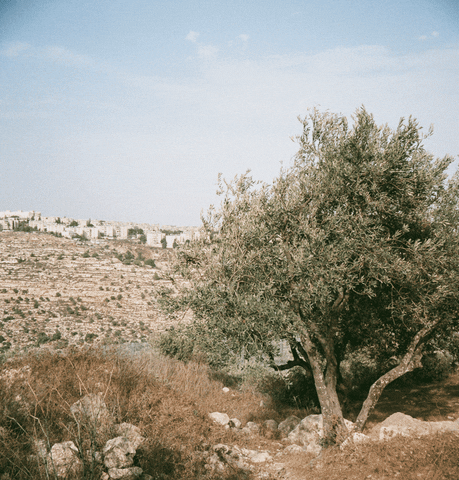
We should preserve it. This needs support. I mean, it could happen. But if I keep lamenting my house and lamenting my country, I’d really go insane. Now, unless they kill me in my house, I won’t get out. I mean, if we hadn’t got out of our area we would’ve been living in heaven, because that was fertile land. – Um Mustafa
We’re standing, against this enemy. Yeah, I mean, we’re preserving it now and our existence here is basically like a thorn in their throat. I am here, I am here. – Fuad
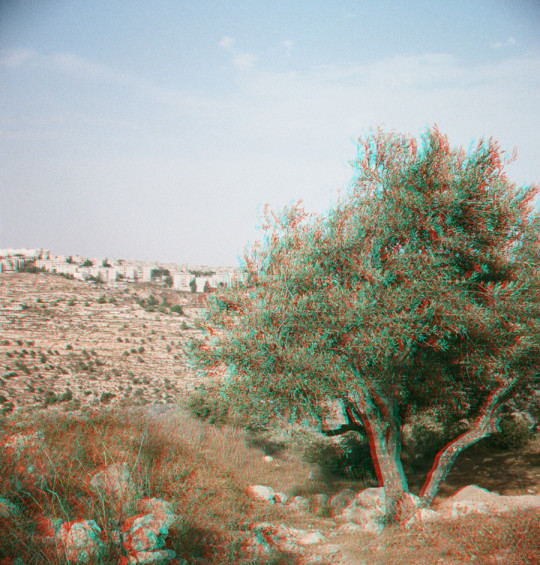

#palestine#west bank#olive tree#free palestine#decolonise palestine#stereography#stereoview#3d photo#anaglyph#wigglegram#35mm#oral history
0 notes
Photo
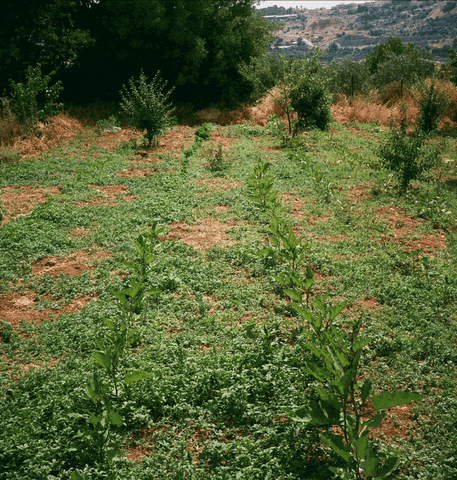
My dad and I work on this land. At the end of the story, it’s for the family, you know. We bought this land from a guy who went to Chile. He had a new life. His family left, so who’s going to take care of the land? Who for? The land here is not very expensive, because nobody knows what’s going to happen next. [But] what happens to us will happen to everyone who has land over here. It’s not going to come on me alone. So, as they say in Arabic, ‘put your heads together, and stay together’. If you’re going to sit at home and wait, you’ll be waiting a long time. A lot of people find gold in this town. They dig under the floor, under the houses. They thought it was the land of the gods, so they gave it as an offering. Or they hid it to keep it. And so many wars happened here, you know. When people went to fight in the war, they brought the gold with them. When they died, it stayed over here.
Many people find it when they start building. They found some gold at the church, crosses and stuff. They put it inside the church. I mean, we hear a lot of stories. But the story I told you, this is a true story about Beit Jala. When people had gold, they just hid it in Al-Makhrour. Then when they went back looking for it, they couldn’t find it anywhere, with these trees. “Ah, we put it here! No… we put it there.” And I know they didn’t find it until this day. It gives you motivation, like you have to take care of the land [because] maybe you’re going to find some, haha. I told you before, when you work here, you feel you did something, you know. Really, I did something. I just want to finish what I started. – Issa M.


#palestine#west bank#wadi makhrour#free palestine#decolonise palestine#stereography#stereoview#3d photo#anaglyph#wigglegram#35mm#oral history
0 notes
Photo
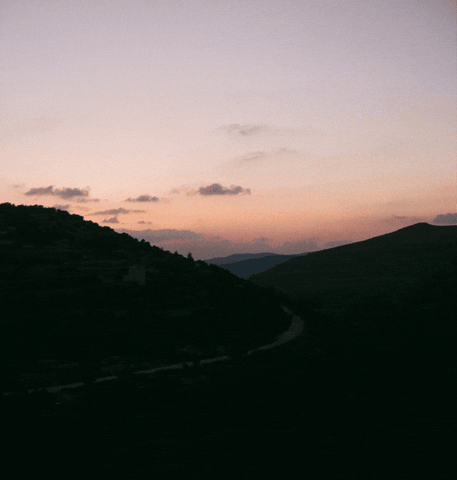
It’s a cool area – there’s no cars, no traffic. It’s so quiet. You can hear the noises of the birds. I like to come here to relax. It’s like a forest, you know. The good thing is to keep it the way it is, for the birds. Nobody touches it. Nobody destroys the forest; they don’t destroy the land with buildings. When you start building, you kill the forest, you kill the land, so there’s nothing left for the animals. Everything is gone for them, so they will start to leave, to go to another area. Look around you: the whole town is very small, right? Everybody’s building, building, building. Some people have some land around their houses, but it’s not that big, you know. Sometimes you need someplace to go if you feel like you don’t want to see anybody, or just to sit alone. That’s the cool thing here: you have nobody here bothering you.
In the night, at sunset, it’s very beautiful. Maybe we’ll see it. Behind the mountain, it’s all red. A few minutes and it’s going to change. See how it changes? We have a good community here, you know. We know one another over here. It’s like a small town. And the culture here is a little bit different – we like to keep connected with one another. We sit together every night; we talk about what’s going on. Yesterday we were here. We had a barbecue and the family sat here all together. It was so fun, so beautiful. When you sit here and nobody bothers you, you don’t feel the time – it runs out very fast, you know. Time moves very fast. When you enjoy your time, you don’t feel it. At the end of the story, you need someplace to relax, you know. Someplace to have… fresh air, let’s say that. – Issa M.
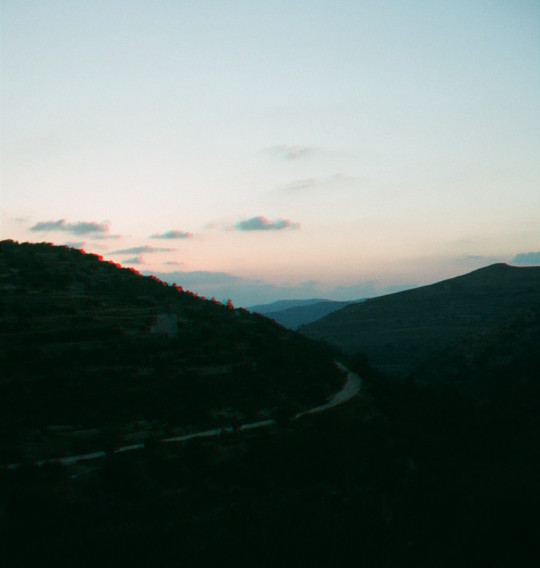
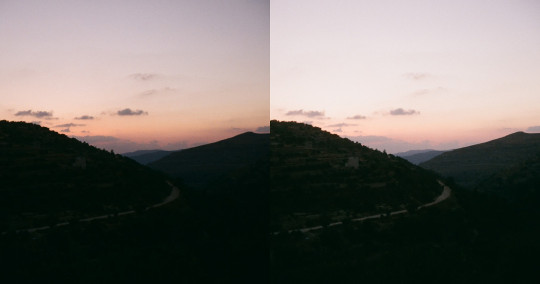
#palestine#west bank#beit jala#wadi makhrour#free palestine#decolonise palestine#stereography#stereoview#3d photo#anaglyph#wigglegram#35mm#oral history
0 notes
Photo
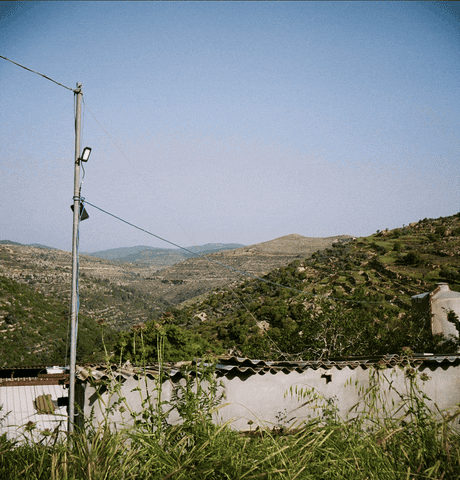
I’m one of those people who loves their land. You know, that piece of land is my joy. I spend most of my time, as a matter of fact, in Al-Makhrour. It’s a beautiful area. I mean, it’s unbelievable. It’s a nice, nice valley. I don’t spend as much time in my house as I spend up there. I enjoy being alone with nature, and that’s about it. When I go up there, I feel really relaxed, like a whole different person. When I’m at home, doing nothing, I feel like I’m tied up or something. So I just crank my engine in my car and go up there. That’s the best way to do it. Just get away from everybody, from all this noise, all the traffic, and stay up there. Even though there isn’t much to do, because as I said, I fixed up my land. But I don’t mind going up there, staying up there, sitting under the tree. You get the fresh air, the view. Honestly, it’s like heaven.
I mean, I was coming back yesterday and I looked at the sun setting down. I said, “God, it’s so beautiful.” As I said, thank God for everything I’ve got. I’m really happy. Fortunately, I know a few people now starting to take care of their land. But we’re talking about the older generation, not the younger one. If they know how to take care of the land, it’ll give them all kinds of things. Like us, this year – you’ve seen how many apricots we’ve got. I mean, we’re talking about more than one tonne of apricots that I’ve picked this year. Why? Because I’m taking care of my land. I grow just about everything. [Our food] is all homemade stuff. It’s 100% organic. It comes out so tasty, it’s beautiful. We live in nature, and it gives us more than we need. So whenever you take care of things, things will take care of you. – Jamal
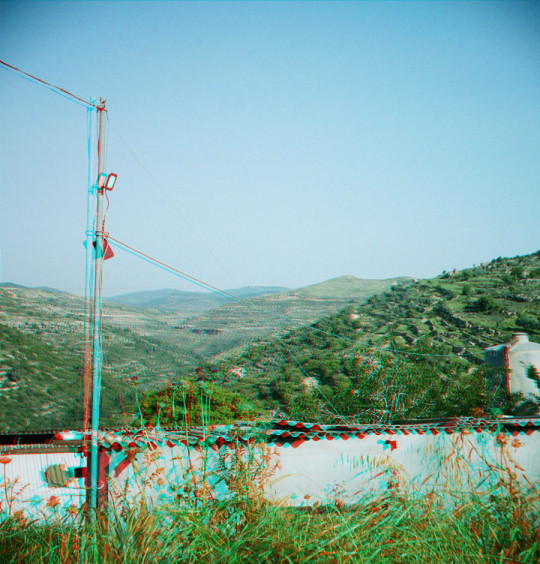

#palestine#west bank#beit jala#wadi makhrour#free palestine#decolonise palestine#stereography#stereoview#3d photo#anaglyph#wigglegram#35mm#oral history
0 notes
Photo
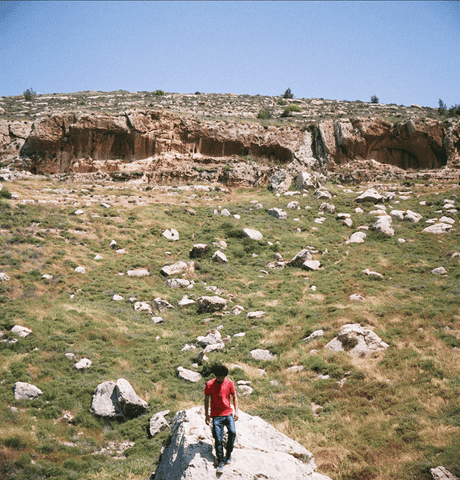
I don’t stay a lot in the village. The days I don’t work, I go out. I go to the evacuated areas. I go with my friends, and we take tents and stay there. So I spend most of my time in nature and I discover places. Mostly, I like sitting in areas like where we’re sitting right now, or other mountain lands, looking at the village. I don’t know, I feel inspiration for work comes [because] I don’t see things in parts. From far away, I start reflecting on things that I didn’t see up close, so I get other ideas. On top of that, the noise – the shouting and people and cars, they ruin my ideas. And there are people sometimes who discourage you when you stay with them. So I like to stay by myself because I feel that I can generate something.
I mean, I spend most of my time going to work and to university, then to the village, so there’ll be a lot of pressure on me. All my thoughts are blocked. But when I go to these kinds of areas, that’s it. Something happens with me and I find solutions, and I even see new work. You’re inspired by nature. I don’t need to be on site to know our situation, because we are living it. When I go to nature, I start thinking about what’s happening to us and why we are like this, and why it’s allowed here, and why it’s forbidden there. And why these areas can’t be approached, why there are borders… I have ideas when I sit with myself. – Mohammad


#palestine#west bank#battir#wadi makhrour#free palestine#decolonise palestine#stereography#stereoview#3d photo#anaglyph#wigglegram#35mm#oral history
0 notes
Photo

Don’t they sometimes say ‘family tree’? This is the family tree. This one is the original, the mother, and these are her daughters, her grandchildren. They are a whole family. This smallest tree is ten months old now. I gave it my son’s name because of my love for the tree. There is a relation between us. I mean, it’s like home. Of course, the tree has rights. I know what it needs. I don’t think, I know. For example, when [it needs] water, when it needs pruning, when it needs ploughing. I like giving it as much as I can. [But] above all, you have to love it. The tree is like a child. One has to always be on the land every day. We have a proverb in Arabic. The farmer and the tree were talking to each other. The farmer told the tree, “I’ll stop ploughing you.” It told him, “I won’t fall.” He told her, “I’ll stop pruning you.” [And so on.]
In the end, he told it, “I’ll stop visiting you.” Then it told him, “Here, I’ve fallen.” So the farmer has to stay present on the land, beside the tree, looking after the tree, because there is a relationship between [them]. I was born here. I always bring the boys here, so that they love the tree and the land, so we remain attached after me. I mean, look, we inherit this intergenerationally. It was my grandparents’, then my parents’. They’re gone, of course, and now we are the third generation. We give generation after generation to preserve this heritage. We will be gone one day, so they have to carry this message, to keep it. I sit here a lot, you see? I sit maybe for an hour. I think of the tree; I sit enjoying it. I say, “After I’m gone, what will happen to the tree?” I think about that a lot. I always think of the tree. – Salah
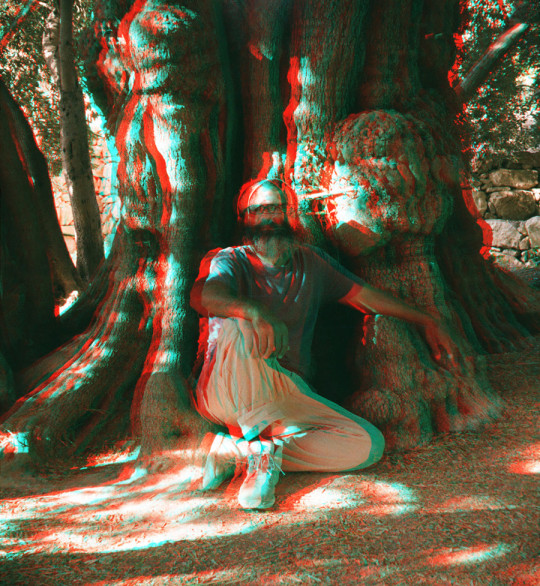
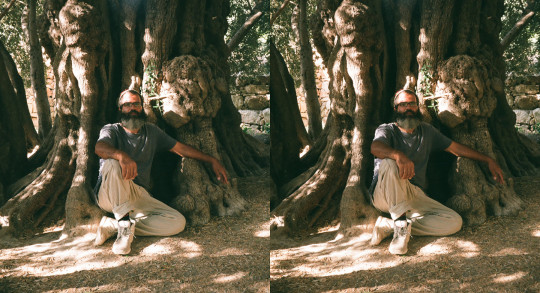
#palestine#west bank#al walaja#olive tree#free palestine#decolonise palestine#stereography#stereoview#3d photo#anaglyph#wigglegram#35mm#oral history
0 notes
Photo

The government has not given anything to the city of Potosí, but it’s helping other places with sports fields, with schools. In these last strikes, it was 27 days and 19 days, and even then, nothing for Potosí. What we want is that in the city there are factories for our children to work. The mineral will run out when our children and grandchildren get older. They are going to migrate; Potosí is going to end up like a camp. We do not want that. The government does not understand, so all of Potosí has stopped, to say, “We do not want to hear it; we do not want you to come here to Potosí.” Because if the mining dies, as I said, it’s going to become a camp. All the people of the place are going to go. They are dying here. Someone needs to realise that, so they can create a factory, at least for our children, for our grandchildren, or for our great grandchildren, so that they can still have work.
If not, who is going to stay? Where are we going to go? Many Potosínos have gone to Sucre. Some are leaving to Argentina. My family lives in Santa Cruz and Cochabamba. But if there had been work here, no Potosíno would leave. If there were factories all over, then we wouldn’t leave. We could work well here. Right now, it’s been a little quiet – when the mining crashes, it’s a little quiet. Those of us who are permanent, [who] have little houses and everything, here we are. One thing I’m going to tell you: the mountain could live about 500 years more. It depends on not working with machinery; it depends on putting up support beams to care for the mountain. It still has mineral, according to what I heard. – Doña Isabel


#bolivia#potosi#cerro rico#world heritage#unesco#stereography#stereoview#3d photo#anaglyph#wigglegram#35mm#oral history
0 notes
Photo

The problem is that they think that [Potosí] must be touristic, but they do not know what we are going to live on. If it were touristic, it would paralyse the mining, you see? So they would no longer work on the mountain, because the mountain would have to be kept there, because I think tourists are coming to get to know the mountain, more than anything. Then once it is paralysed – it is already paralysing, little by little – what will become of us? Without mining there are no sales; everything is paralysed. Who is going to buy from us? Obviously, we would have to go elsewhere, to work on something else. Where are we going to go to work?
Maybe we are going to have to go to other places. Where are we going to leave to? You think they’re going to give us a house? What is going to remain here? What’s it going to be? Dead. It will be difficult. As long as you give them, say, those mountains there, if there is ore, [they] can find it. But the problem is that the peasants do not want to give [anything] up either. So that’s why [they should] stop the mining and give us sources of work, that there be factories, everything so that many people can work, not always in the mine. The peasants, they go to their fields, they eat their potatoes, their corn, their grain, and anything they want. But we do not have ranches. – Doña Carmen


#bolivia#potosi#mondragon#world heritage#unesco#stereography#stereoview#3d photo#anaglyph#wigglegram#35mm#oral history
0 notes
Photo
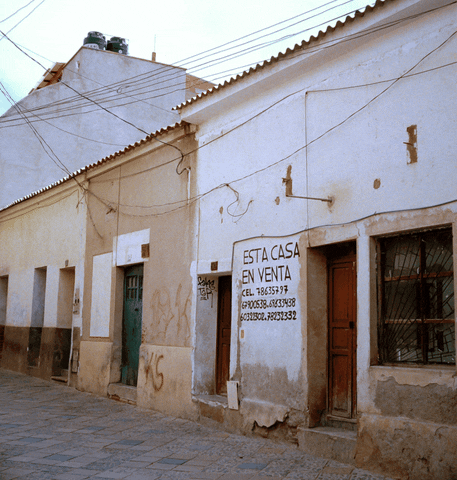
I’ll leave you with some data about my family. There are 12 siblings [and] only two of us live in Potosí. I left Potosí in ‘87: first to Sucre, then to Cochabamba, then to La Paz. [Then] I came back by my own choice. I said, “I have to do something for Potosí.” I came back, and I stayed with my little sister because she was still [here] studying [to be] a civil engineer. My little sister told me, “I have to leave Potosí, because there is no work here.” I do not know how to make her stay. So imagine: if we make a statistic of my family, 10% have stayed in Potosí; 90% have left Potosí. – Enrique
Wow, why would anyone leave Potosí? For me, it is a magical city, with its streets, with its cold. We enjoy it for that [reason]. Some say, “We do not go to Potosí. How can you live in that cold city?” “Yes!” I say, “It can be cold, but we enjoy that wind, the ‘chiriguayrita’, as they say.” It is an icy wind, but we enjoy it. If I ever travel, I always return to Potosí. Once I feel the air, I feel at peace. I despair of leaving Potosí. It may be cold, but the quality of the people is stronger. The heart is warm; that’s more important. – Gris
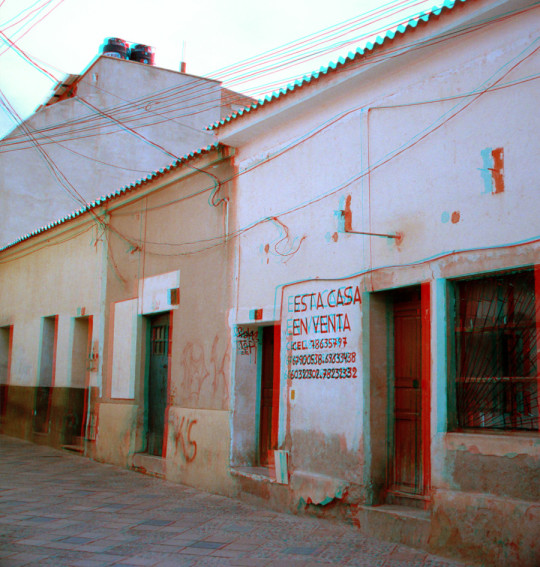

#bolivia#potosi#world heritage#unesco#stereography#stereoview#3d photo#anaglyph#wigglegram#35mm#oral history
0 notes
Photo

Unfortunately, as I work in tourism, the last two years have been very hard for me. I have been frustrated that there have been strikes. There are no people [and] the bank is cornering me. I think that for many people who work in tourism, it is the same situation. But I have supported, and I continue to support that the claims for Potosí are not crazy, they are fair. There is a theory that people tend to leave Potosí. I know that a lot of people tend to leave because the opportunities are not… At some point we will talk about it, because I have already lived it in my own flesh. I mean, the mayor has no interest in supporting various projects, such as those in tourism. People get tired of this, and they tend to leave, just as is happening nowadays. For years we’ve been told that there are valuable minerals below our city. Potosí is being [circumvented by roads], isolated to be able to mine in the open.
As a historic city – as one of the economic pillars that has sustained Bolivia and part of the world – Potosí should be one of the main centres and should have more. Not so much in terms of modernity, but in terms of services and conservation of historical heritage. The main thing they should invest in is more resources, considering that what the city gives is never repaid. In my opinion, decentralisation and autonomy should be applied, where we ourselves can manage our resources. For that, we should resort to knowledgeable people, and people who can really see the potential Potosí. At some point, we could live on tourism. We could make a real industry without chimneys. – Jacinto


#bolivia#potosi#cerro rico#world heritage#unesco#stereography#stereoview#3d photo#anaglyph#wigglegram#35mm#oral history
0 notes
Text
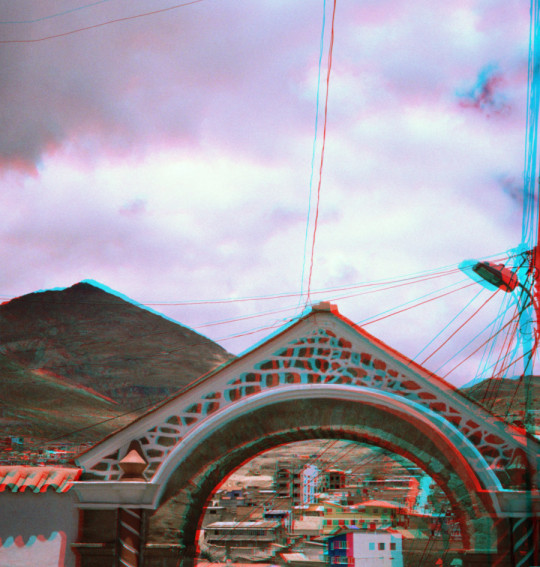
Imagine that you are going to live in Potosí. The fact is that Potosí is a native mining town. Only mining sustains us. We have always been miners and we will not stop being like that. People are mostly accustomed to it, even before our parents. I was told that I should be a miner, [but] I did not like mining for myself, and from there I dedicated myself to tailoring. It has been a success that the children and the grandchildren went away from mining, little by little. We left the monotony of going to the mine. As they are taking out so much mineral, there are times when the mineral [value] goes up. But once the Potosí mineral is low, it’s left abandoned: we have no other income. So with that, the Potosí mining lowers the economy. In the days when the prices of tin fell, I had a low point myself: no work, no money.
There is a downturn, but when it rises again, there is another economic movement. It is the only thing that moves Potosí, tin money. If there is no such thing, there is nothing. We do not have factories, sources of work of any kind. It will have to remain as a mining camp. Mining holds us up, but [the mountain] will sink down sooner or later, if they don’t stop taking out so much mineral from there. But if we stop it, how are we going to survive? I mean, sooner or later, we are going to dry up. Once it is finished, let’s say, what are we going to live on? Where are we going to work? We are going to have to leave, like many people [already have]. Our Potosí will be forgotten in time. It will not last more than 15 to twenty years. It will not be worth anything, because we have nothing to support ourselves. – Don Freddy

#bolivia#potosi#cerro rico#world heritage#unesco#stereography#stereoview#3d photo#anaglyph#wigglegram#35mm#oral history
0 notes
Photo
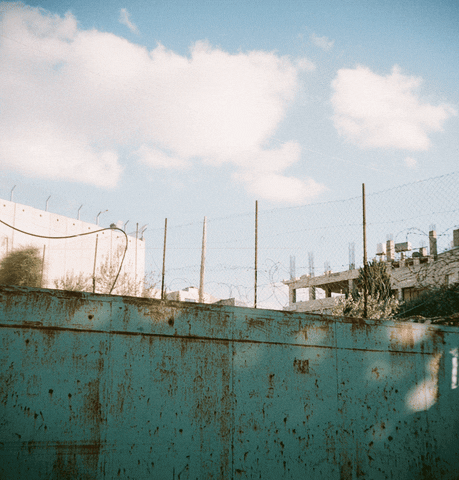
I think that kids have the most interesting minds [and] the most interesting stories. They always point out something that [makes you go,] “Oh!” I feel that people get less and less creative with age – you don’t see the world as interesting as it is, when you grow up. And [kids] know everything, even the secrets! They’re always around, listening. But actually, kids from different parts of Palestine are so different. From [Aida] camp to Beit Jala, they’re different. It’s the situation they live in that produces difference. Just imagine: [there is] more political contact here because here is the wall. There’s always fights and clashes, right here. And you know, when you have your brother taken to prison and your cousin was murdered and stuff like that, you will grow up differently to a kid who goes to school, then to play with their neighbours and back home with their family.
It’s an interesting place to live and grow up. It’s hard, but I think I’m blessed that I’m here, really. A lot of places around the world have different and difficult situations, I know that. But I [also] know that a lot of other places are easier than here. So maybe it’s a good thing to grow up in a difficult place. I think we’re in the middle. I can connect with better situations, and I can connect with more difficult [situations]. I can understand, even if I don’t live that. Maybe because we know that nothing ever works from the first try. We know that. This is the only situation we know. So when you’re thinking about an idea, you’re always making a ‘Plan D’, even before the first try. You work hard for the first plan to work, but usually [it’s] the second or the third. I think it will be easier to get to know other places after you get to know this place. – Rana

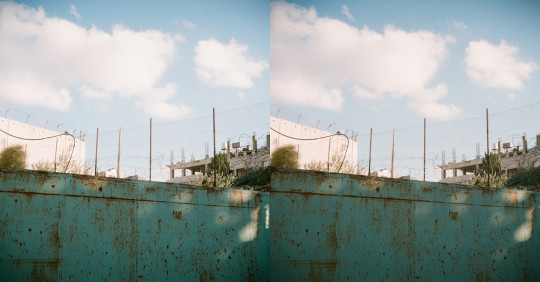
#palestine#west bank#aida camp#free palestine#decolonise palestine#stereography#stereoview#3d photo#anaglyph#wigglegram#35mm#oral history
0 notes
Photo

One place that attracts me here is the mountain. It was the first thing that attracted me. I had an image of being there. I worked as a music teacher at an NGO and I worked with mining children for six years. This gentleman arrived who is an educator. He came from Cochabamba – he worked with children and drug addicts. I was contracted to give music lessons to the children, who are from Pailaviri, Maria, Caracoles, Robertito, and so many mines that have now gone from my mind. What was the purpose of the foundation? It was that the miner’s child did not go to work in the mine. Basil was my student, [along with] his brother. We went up with more kids, to the top. We climbed in two hours, up to the side where now it looks like a slip.
We got there. Here there was a very large stone. There were native palliris’ tables, with their minerals. That would have been a very large space for the palliris. This area was not [yet] sunk, and it is unfortunate because [now] they have been buried. That gave me great sadness. My students indicated to me: “This is this; this is that...” Your students know more than you! When you are born in the mine, you know more. I cannot believe that four children were the ones who took me up, up to the peak. You normally do not arrive to the top in two hours, but they already knew the way. We went up – “Come here; come this way” – and they took me to this key place. I feel so lucky to have gone to these types of places. I have pieces of mineral from that. – Lucho


#bolivia#potosi#cerro rico#world heritage#unesco#stereography#stereoview#3d photo#anaglyph#wigglegram#35mm#oral history
0 notes
Photo
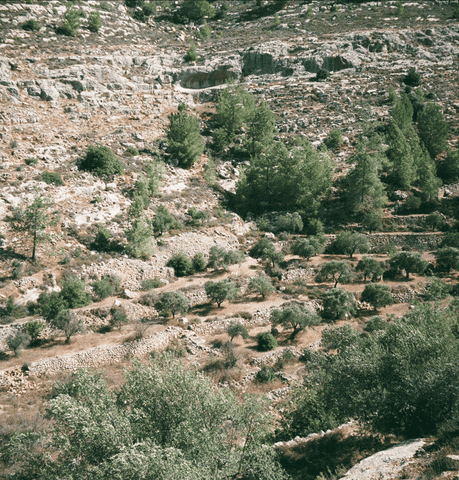
I’m interested in biodiversity. People started to always call me due to my knowledge of the area. I became famous, and today they call me from anywhere: “How can we go to that place?” I give students [on] school trips the basics of the climate and soil, the area’s geography [and] rocks, then we go to the classification of plants and animals in the area, and if there’s a historical landmark, antiquities, or a water spring. Now, there’s the other thing we talk a lot about in nature, which is medicinal plants: their uses, getting to know toxic and non-toxic, and not to eat something in nature without knowing and making sure of it. There’s a proverb that I heard, that seeing settles in the mind more than listening. So when the student goes out seeing the biodiversity with their own eyes, seeing nature, geography, [and] history, it settles in their mind better than listening in a lecture in class.
For example, there’s the maple tree called ‘madrones’ – arbutus in Latin, I think. [It’s] not numerous; it’s threatened with extinction in our area. Its fruits are important for a kind of bird, the jay. All birds eat its fruit, but mostly this bird. It’s its favourite. It’s heritage. When we sit looking at this tree, we tell them its traditional story. The story isn’t real, but a fairy tale, like folklore. The tree colour is distinguished from all the other trees – its trunk is a special red. Colloquially, they call the tree ‘father’s killer’. The story is very long, but most importantly, the summary is that a son sent his father to ask a girl’s hand from [another] clan. When the dad went to take her, he asked her hand for himself. When they came and told him, the son killed his dad. He hit his head against the tree, and he bled on the tree, and the tree became red. How’s the tale?! – Ibrahim M.
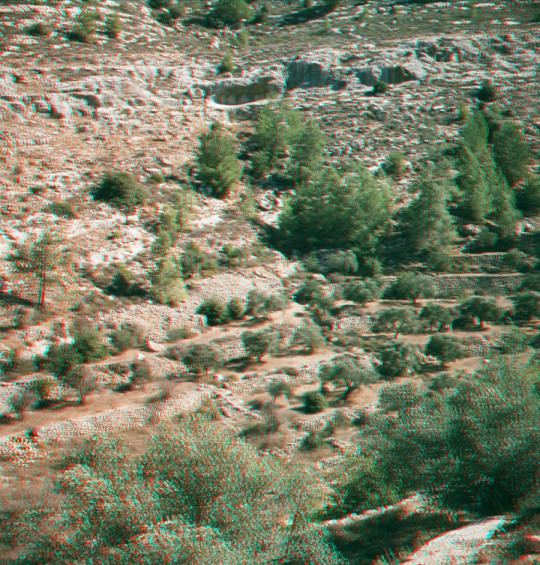
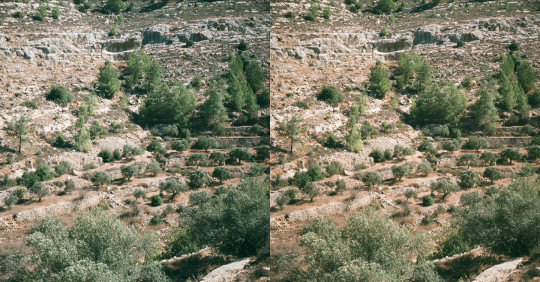
#palestine#west bank#wadi makhrour#world heritage#unesco#free palestine#decolonise palestine#stereography#stereoview#3d photo#anaglyph#wigglegram#35mm#oral history
0 notes